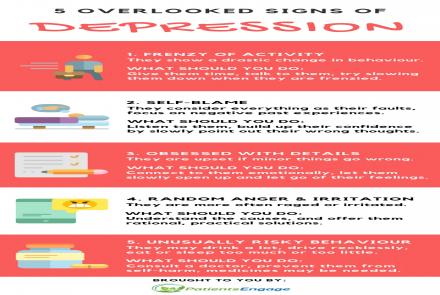
Depression can manifest itself in many different ways. Learn to recognise signs of depression in a friend or a family member. Counsellor Animitra Ghatak shares the surprising signs of depression and how you can help.
Depression is a mood disorder that may affect any of us at some point in our lives. This can be triggered by setbacks in life, bereavement or a chronic illness. Depression is not just about feeling sad or down. It affects the mind and the body. It disrupts different aspects of life – from working to eating, sleeping and socialising – and it can manifest in different ways.
We think of a depressed person as one bowed by sadness, tearful and with minimal interaction with people. While this is often true of people with severe depression, this is not always the case. Depression brings about a change in behaviour. If a friend or loved one is behaving differently, it could be a sign of depression.
Here are 5 surprising symptoms of depression, and what you can do to help your depressed family member or friend. People who are depressed often find it difficult to help themselves, so your actions are key.
1. Frenzy of activity
This is a sign of grief. Grief can be expressed as quietness and isolation or as manic behaviour, frenzied shopping trips, long hours at the office. We feel grief when there’s a life-changing event such as divorce, or the loss of a loved one, even a beloved pet. Grief is natural and normal, but extended grief, and drastic change in behaviour, is not.
What should you do: If your family member or friend is grieving, you should give the person time to grieve. It helps in accepting the loss or the altered circumstances of life. But if this state carries on for a long period of time, you have to intervene. Try to help slip the person back into a normal routine. Communication is a must. It doesn’t have to be words… Your mere presence will be enough. If the person is stuck in a room, try and get him/her to go out. If the person is behaving in a manic manner, then help the person to slow down and see his or her actions in the right perspective.
2. Self-blame
They blame themselves for things, both big and small. They obsess about mistakes made in the past. They may even blame themselves for things that were not their fault. They focus on negative experiences in their life. This makes the person introspective and withdrawn. They keep digging deeper and deeper into the bottomless pit of their ‘faults’ and they spiral downwards.
What can you do: Listen in a non-judgemental way and allow the person to vent all his/her negative feelings. Don’t directly contradict what they are saying. But slowly and gently, point out the wrong lines of thought that the person is having and slowly try to build up their confidence in themselves.
3. Obsessed with details
Everything has to be done just so. They are bossy and domineering and they are upset if any minor thing is out of place. They are not open to any discussion. This person is depressed but is in denial. There are unresolved issues that he or she is not willing to face.
What can you do: Try to understand what they are feeling. Connect to that person emotionally through gentle conversation so that he or she slowly opens up to you. Then try to help that person let go of their feelings.
4. Random anger and irritability
People think of depression as sadness, crying and melancholy, but anger can be a common sign too, especially in men. It might be that anger is a more comfortable and socially acceptable channel of expression for men. Someone grieving from a death, a recent divorce or being forced to take up a job that the person thinks is beneath them, may not be able to get through the day without expressing rage at home or being more irritable at work.
What can do you do: Find out what is troubling the person. Talk to them. Be wary of getting sucked into his anger. Whatever he says, you must never lose your cool. Do not interrogate the person or force them to speak about their troubles. Instead, try to win their trust and they will talk at some point. Once you understand the cause of their depression, try to offer rational, practical solutions, which will solve, if not all, at least part of the problem.
5. Unusually impulsive or risky behaviour
This usually stems from a lack of self-worth and is a latent desire for suicide. Suicide represents the ultimate escape from life’s challenges. This state of mind is expressed in some of the following behaviours:
- Heavy drinking
- Eating too much or too little
- Reckless driving
- Sleeping too little or too much and then being unable to reach the workplace on time in the morning
These are self-destructive behavioural patterns.
What can you do: This requires medical help and you need to consult a doctor or a psychiatrist. You also need to closely monitor the person so that he does not do anything to harm himself. Counselling will help, but medicines may also be required if this behaviour escalates.
Your role as friend
The most important word, when trying to help someone with depression, is ‘empathy’. Empathy is to identify with another person’s feeling, thoughts and attitude. Understanding the emotion that is playing in the other person’s mind is crucial to your helping the person. Providing a warm and loving, but not overpoweringly cloying atmosphere, will help nurture the depressed person. In short, “being there” for the person is necessary.
You will also have to keep a sharp eye out for suicidal thoughts or tendencies. It has been estimated that between 6 and 15 per cent of people who suffer from severe depression commit suicide. If your loved one mentions a lack of desire to live, wanting to commit suicide or dreaming of fatal accidents happening to them, it is important to see a psychiatrist or a counsellor immediately.
How do you get them to see a doctor? Often, a depressed person will not want to consult a doctor or a counsellor.
One way to edge them out of inactivity and apathy is to introduce a change in their daily routine. This could be in the form of exercise, yoga, a movie or a short trip. If the feel-good factor can be introduced into the person’s life, that could be the first step to getting them the counselling or psychiatric help that the person needs.
Check out the summary Infographic on 5 Surprising Signs of Depression
How to get help:
Suicide Prevention Helplines in India
Suicide Prevention Helpline in Singapore
















